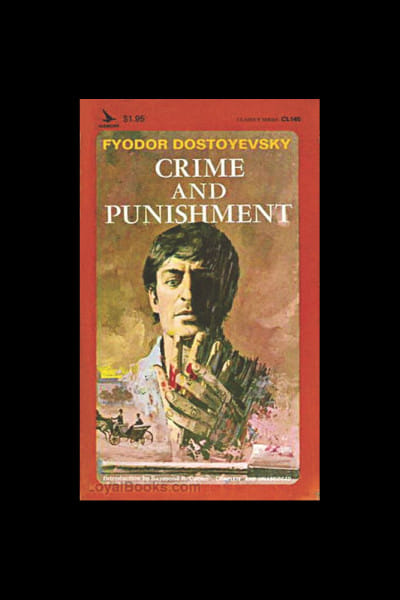A Fugitive's Pendulous Mind

Fyodor Dostoyevsky's Crime and Punishment is perhaps one of the best books for a transparent understanding of 19th century Russia through the eyes of an absconding murderer. This monumental novel speaks of the phenomena that can persuade people to commit crimes, the inner torment that forces people to burn with a feeling of guilt and the ultimate expiation offenders go through while playing cat and mouse with their conscience.
Raskolnikov, a Russian young man grew up in Saint Petersburg with a cynical attitude towards the people and institutions around him. His contempt to society arose from the widespread social discrimination that prevailed across his hometown. Class inequity, poverty, hunger, exploitations plagued Saint Petersburg during 19th century and Raskolnikov also got victimized under these untoward circumstances. The dehumanizing effects of social injustice took away love and pity from Raskolnikov's heart and gradually turned him into an oddball. He viewed everything and everyone with disdain and suspicion. One day he had a quarrel with his landlady over house rent and killed her on the spur of the moment. He committed another murder shortly as a result of which he had to go into hiding to escape the vision of Russian police force. He moved away from one place to another constantly to keep out of the reach of policemen. However, an intense feeling of internal self-indictment nagged him all the time never allowing him to forget the crimes he had committed. He oscillated like a pendulum between two thoughts—whether he should keep on running away days after days or surrender to the cops. It shows Raskolnikov was not at all a hardcore, insensitive criminal. He committed crimes being instigated by a sense of dismay, a sense of being cornered all the time. For this reason, he had a divided mind—one of a lawbreaker and another of an ethical man. In course of time he got introduced to a call girl named Sonia. He found some commonalities between Sonia and him. Sonia belonged to the repressed and exploited class of society, a feature that disoriented Raskolnikov too. Sonia could not talk about her profession independently. Likewise, Raskolnikov could not unfold his criminal records. They both got inclined towards one another because of these similar things. Raskolnikov made confessions to Sonia about his misdeeds. Sonia sympathized with him. In the meantime Raskolnikov made friends with another man who was a cop under cover. Sonia, on the other hand, advised Raskolnikov to hand over himself to the law to get rid of his inner sense of condemnation. Committing a crime is wrong while hiding a crime takes away mental peace—that is one of the vital points to be picked from this novel. The blood-spattered images of the murder victims haunted Raskolnikov and made life too troublesome to lead.
At the end of the novel we find Raskolnikov surrendering to the police. He received a penal sentence for eight years. Though the sentence of imprisonment first shocked Raskolnikov, later on he came to realize that he had been subconsciously waiting for an institutional punishment. So, the sentence by the court pacified him to some extent. Crime never pays and no crime ever goes unpunished—these two maxims are strongly asserted through the ordeal of Raskolnikov. Some more angles of Crime and Punishment should also be addressed. No one is a criminal by birth. Rather hostile circumstances and social deprivations spoil the moral sanctity of people and make them criminals like it happened to Raskolnikov. Sonia plays a highly noteworthy role in this novel by lightening the heart of Raskolnikov through listening to him with a benign approach. Moreover, Sonia told Raskolnikov about the importance of state law to prosecute and reform criminals. Sonia being a whore is neither recognized nor respected by society but she still speaks in favour of socio-legislative principles. It is an implication that a beautiful heart dwells inside Sonia. We should not judge whether people are good or bad in terms of their social status. Sonia earns money working in a red light area but she turns out to be a law-abiding citizen as the plot of Crime and Punishment proceeds.
Punishment is inevitable once a crime is committed. When a criminal ducks away from the clutches of law it does not mean he has got rid of punishment. If his mind keeps on burning with the flames of penitence, this is a severe punishment too and we find Raskolnikov suffering from this self-imposed penalty while running around as a fugitive. Fyodor Dostoyevsky attached importance to the idea of high moral force by making Raskolnikov feel acutely repentant for the murders he committed. At the same time, the novelist upheld the supremacy of state-regulated law through Raskolnikov's imprisonment. In this way Fyodor Dostoyevsky illustrated a unique confluence of moralistic and legislative norms.
The reviewer is Vice President, Chowdhury Philanthropic Trust, Sylhet.
Email: [email protected]

 For all latest news, follow The Daily Star's Google News channel.
For all latest news, follow The Daily Star's Google News channel. 







Comments